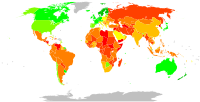
Role of self-efficacy in nursing organizational climate: A way to develop nurses' humanistic practice ability.
Sign Up to like & getrecommendations! Published in 2021 at "Journal of nursing management"
DOI: 10.1111/jonm.13516
Abstract: AIM To investigate the impact of self-efficacy on the relationship between organisational climate and humanistic practice ability (HPA) in Chinese nurses. BACKGROUND To date, studies on the effect of organisational climate on nursing care have… read more here.
Keywords: self efficacy; climate; humanistic practice; practice ability ... See more keywords

Organisational Climate and Pro-environmental Behaviours at Work: The Mediating Role of Personal Norms
Sign Up to like & getrecommendations! Published in 2021 at "Frontiers in Psychology"
DOI: 10.3389/fpsyg.2021.635739
Abstract: Organisations are currently strongly encouraged to adopt more responsible production patterns aligned with sustainable development goals (SDGs). Pro-environmental behaviours (PEBs) in the workplace can strengthen the expected positive impacts of organisations’ environmental performance and engender… read more here.
Keywords: work; personal norms; role; pro environmental ... See more keywords

How Do Nepotism and Favouritism Affect Organisational Climate?
Sign Up to like & getrecommendations! Published in 2022 at "Frontiers in Psychology"
DOI: 10.3389/fpsyg.2021.710140
Abstract: This study seeks to determine the effect of nepotism and favouritism on organisational climate. Using the method of random sampling, 269 persons working in Lithuanian organisations were surveyed. The received data was analysed via the… read more here.
Keywords: favouritism affect; nepotism favouritism; climate; organisational climate ... See more keywords

Organisational Climate, Role Stress, and Public Employees’ Job Satisfaction
Sign Up to like & getrecommendations! Published in 2019 at "International Journal of Environmental Research and Public Health"
DOI: 10.3390/ijerph16101792
Abstract: The Job Demands-Resources (JD-R) model is an integrative theoretical framework for monitoring workplaces with the aim to increase job engagement and prevent burnout. This framework is of great interest since the management of job resources… read more here.
Keywords: job satisfaction; role stress; job; organisational climate ... See more keywords